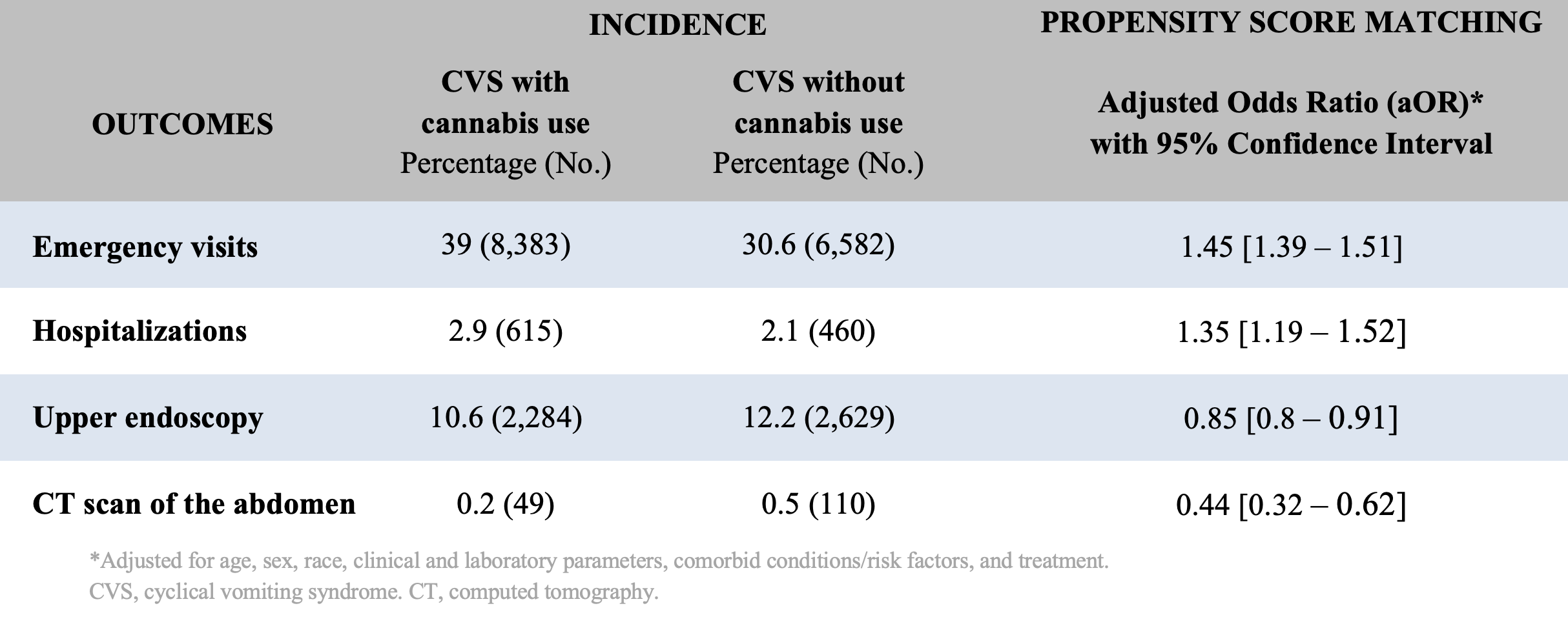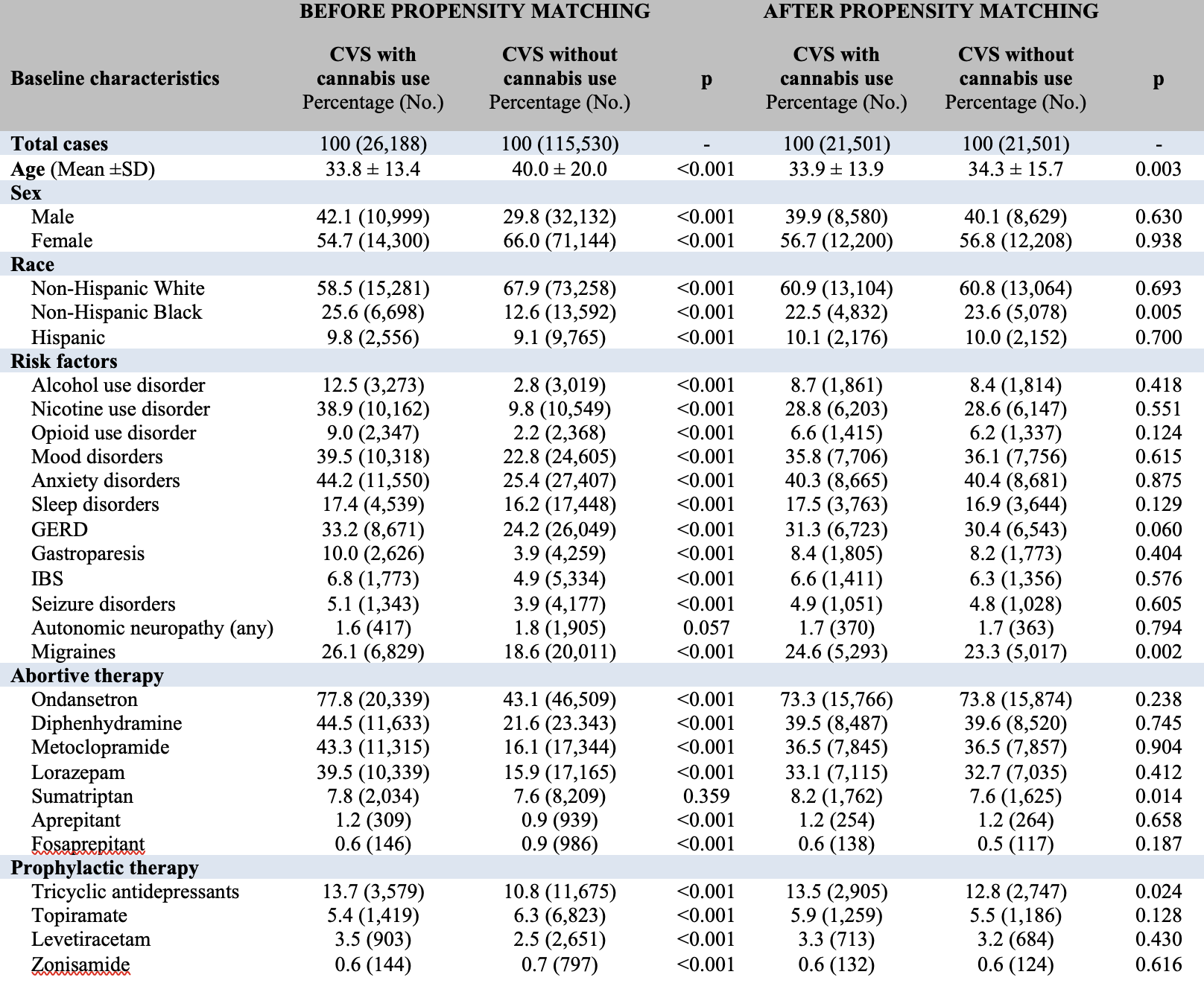Monday Poster Session
Category: Functional Bowel Disease
P2935 - Cannabis Use Increases Healthcare Utilization in Patients With Cyclical Vomiting Syndrome: A Propensity-Matched Analysis
Monday, October 27, 2025
10:30 AM - 4:00 PM PDT
Location: Exhibit Hall

Yassine Kilani, MD
Saint Louis University School of Medicine
Saint Louis, MO
Presenting Author(s)
Yassine Kilani, MD1, Mahmoud Y. Madi, MD2, Muhammad Aqib Jamil, MBBS3, Shahryar Khan, MD4, Saqr Alsakarneh, MD, MS5, Mohammad Aldiabat, MD6, Adam D. Farmer, MD, PhD7
1Saint Louis University School of Medicine, Saint Louis, MO; 2University of Texas at Austin Dell Medical School, Austin, TX; 3Liaquat University of Medical and Health Science, East Liverpool, OH; 4University of Kansas Medical Center, Kansas City, KS; 5Mayo Clinic, Kansas City, MO; 6Washington University School of Medicine in St. Louis, Saint Louis, MO; 7SSM Health Saint Louis University Hospital, Saint Louis, MO
Introduction: Cyclical Vomiting Syndrome (CVS) carries a significant financial burden on the U.S. healthcare system due to recurrent emergency department (ED) visits and hospitalizations. Large database studies showed a reduction in healthcare resource utilization among cannabis users as compared to non-cannabis users, with potential methodological limitations related to CVS classification. Therefore, using real-world data, we aimed to assess the impact of cannabis on the outcomes of individuals diagnosed with CVS.
Methods: We conducted a retrospective cohort study in the US using the TriNetX research network to identify adults ≥ 18 years with CVS. Patients were stratified by cannabis use into two groups: patients with CVS and cannabis use, and non-cannabis users with CVS (controls). Cohorts were matched using 1:1 propensity score matching on demographics, body mass index (BMI), comorbid conditions (e.g., risk factors for CVS), and treatment (e.g., abortive and prophylactic therapy). Outcomes included all-cause emergency department (ED) visits and hospitalizations, rates of esogastroduodenoscopy (EGD), and computed tomography (CT) of the abdomen.
Results: A total of 21,501 patients with CVS using cannabis were propensity matched with 21,501 controls. Among unmatched samples, cannabis users with CVS were younger, with higher rates of mood/anxiety/sleep disorders, GERD, gastroparesis, IBS, migraines, and were more likely to use alcohol/nicotine/opioids (all p< 0.001), as compared to controls (Table 1). Furthermore, patients with CVS with reported cannabis use were more likely to be treated with both abortive (p< 0.001) and prophylactic therapy (e.g., tricyclic antidepressants) (p< 0.001; Table 1). Among matched samples, cannabis use in patients with CVS was associated with a 45% increase in rates of ED visits (adjusted odds ratio (aOR) = 1.45, 95%CI: 1.39-1.51) and a 35% increase in rates of hospitalizations (aOR = 1.35, 95%CI: 1.19 – 1.52), along with reduced rates of EGDs (aOR = 0.85, 95%CI: 0.8 – 0.91), and CT of the abdomen (aOR = 0.44, 95%CI: 0.32 – 0.62; Table
Discussion: This cohort study is the first study using real-world evidence showing significantly increased odds for all-cause ED visits and hospitalizations among cannabis users with CVS as compared to non-cannabis users. Therefore, the use of cannabis in this patient population should be approached with caution due to the heightened risk of adverse effects and financial burden on the U.S. healthcare system.

Figure: Table 1. Baseline characteristics when evaluating cannabis use in patients with a diagnosis of cyclical vomiting syndrome

Figure: Table 2. One-year outcomes when evaluating for cannabis use among patients with cyclical vomiting syndrome
Disclosures:
Yassine Kilani indicated no relevant financial relationships.
Mahmoud Madi indicated no relevant financial relationships.
Muhammad Aqib Jamil indicated no relevant financial relationships.
Shahryar Khan indicated no relevant financial relationships.
Saqr Alsakarneh indicated no relevant financial relationships.
Mohammad Aldiabat indicated no relevant financial relationships.
Adam D. Farmer indicated no relevant financial relationships.
Yassine Kilani, MD1, Mahmoud Y. Madi, MD2, Muhammad Aqib Jamil, MBBS3, Shahryar Khan, MD4, Saqr Alsakarneh, MD, MS5, Mohammad Aldiabat, MD6, Adam D. Farmer, MD, PhD7. P2935 - Cannabis Use Increases Healthcare Utilization in Patients With Cyclical Vomiting Syndrome: A Propensity-Matched Analysis, ACG 2025 Annual Scientific Meeting Abstracts. Phoenix, AZ: American College of Gastroenterology.
1Saint Louis University School of Medicine, Saint Louis, MO; 2University of Texas at Austin Dell Medical School, Austin, TX; 3Liaquat University of Medical and Health Science, East Liverpool, OH; 4University of Kansas Medical Center, Kansas City, KS; 5Mayo Clinic, Kansas City, MO; 6Washington University School of Medicine in St. Louis, Saint Louis, MO; 7SSM Health Saint Louis University Hospital, Saint Louis, MO
Introduction: Cyclical Vomiting Syndrome (CVS) carries a significant financial burden on the U.S. healthcare system due to recurrent emergency department (ED) visits and hospitalizations. Large database studies showed a reduction in healthcare resource utilization among cannabis users as compared to non-cannabis users, with potential methodological limitations related to CVS classification. Therefore, using real-world data, we aimed to assess the impact of cannabis on the outcomes of individuals diagnosed with CVS.
Methods: We conducted a retrospective cohort study in the US using the TriNetX research network to identify adults ≥ 18 years with CVS. Patients were stratified by cannabis use into two groups: patients with CVS and cannabis use, and non-cannabis users with CVS (controls). Cohorts were matched using 1:1 propensity score matching on demographics, body mass index (BMI), comorbid conditions (e.g., risk factors for CVS), and treatment (e.g., abortive and prophylactic therapy). Outcomes included all-cause emergency department (ED) visits and hospitalizations, rates of esogastroduodenoscopy (EGD), and computed tomography (CT) of the abdomen.
Results: A total of 21,501 patients with CVS using cannabis were propensity matched with 21,501 controls. Among unmatched samples, cannabis users with CVS were younger, with higher rates of mood/anxiety/sleep disorders, GERD, gastroparesis, IBS, migraines, and were more likely to use alcohol/nicotine/opioids (all p< 0.001), as compared to controls (Table 1). Furthermore, patients with CVS with reported cannabis use were more likely to be treated with both abortive (p< 0.001) and prophylactic therapy (e.g., tricyclic antidepressants) (p< 0.001; Table 1). Among matched samples, cannabis use in patients with CVS was associated with a 45% increase in rates of ED visits (adjusted odds ratio (aOR) = 1.45, 95%CI: 1.39-1.51) and a 35% increase in rates of hospitalizations (aOR = 1.35, 95%CI: 1.19 – 1.52), along with reduced rates of EGDs (aOR = 0.85, 95%CI: 0.8 – 0.91), and CT of the abdomen (aOR = 0.44, 95%CI: 0.32 – 0.62; Table
Discussion: This cohort study is the first study using real-world evidence showing significantly increased odds for all-cause ED visits and hospitalizations among cannabis users with CVS as compared to non-cannabis users. Therefore, the use of cannabis in this patient population should be approached with caution due to the heightened risk of adverse effects and financial burden on the U.S. healthcare system.

Figure: Table 1. Baseline characteristics when evaluating cannabis use in patients with a diagnosis of cyclical vomiting syndrome

Figure: Table 2. One-year outcomes when evaluating for cannabis use among patients with cyclical vomiting syndrome
Disclosures:
Yassine Kilani indicated no relevant financial relationships.
Mahmoud Madi indicated no relevant financial relationships.
Muhammad Aqib Jamil indicated no relevant financial relationships.
Shahryar Khan indicated no relevant financial relationships.
Saqr Alsakarneh indicated no relevant financial relationships.
Mohammad Aldiabat indicated no relevant financial relationships.
Adam D. Farmer indicated no relevant financial relationships.
Yassine Kilani, MD1, Mahmoud Y. Madi, MD2, Muhammad Aqib Jamil, MBBS3, Shahryar Khan, MD4, Saqr Alsakarneh, MD, MS5, Mohammad Aldiabat, MD6, Adam D. Farmer, MD, PhD7. P2935 - Cannabis Use Increases Healthcare Utilization in Patients With Cyclical Vomiting Syndrome: A Propensity-Matched Analysis, ACG 2025 Annual Scientific Meeting Abstracts. Phoenix, AZ: American College of Gastroenterology.
